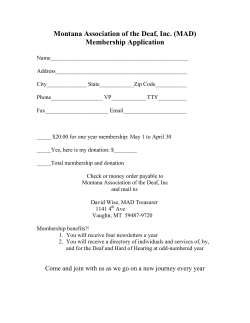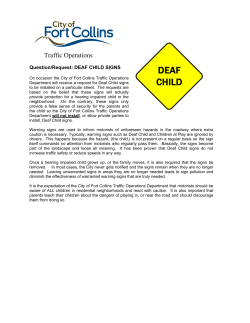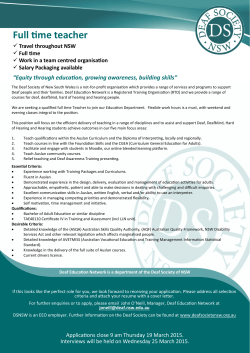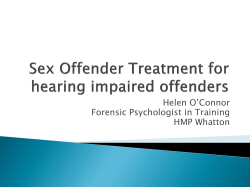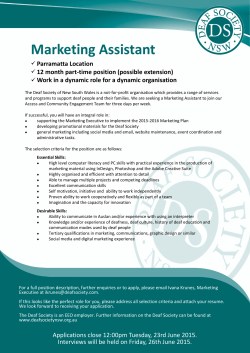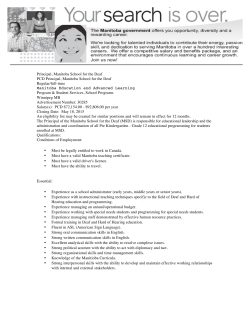
Oregon Association of the Deaf, Inc.
March 25, 2015 Senator Sara Gelser, Chair Senate Committee on Health Care and Early Childhood Oregon State Legislature 900 Court Street NE Salem, OR 97301 Dear Senator Gelser, Deaf people are easy to spot in a crowd. We’re usually the only ones conversing in American Sign Language. Last year a Deaf woman spotted me with some friends at a festival. She shared a frightening story: She was trapped in an abusive relationship. She said the authorities had come several times to investigate. Every time, they came and left without doing anything to get her help. She had no videophone for video interpreted phone calls, like I and my friends do. She had no email. She was unable to tell her mother or brother because they do not know sign language. No one around her could communicate with her, except her abusive husband. The authorities left each time without doing anything further because they let the husband be this woman’s interpreter. Why would the husband let on to anything wrong? Another time, the Portland Homeless Shelter contacted me about an elderly Deaf couple who had been put out on the streets. The couple was not eligible to stay at Brookdale Chestnut Lane, an assisted living center for Deaf, DeafBlind, and Hard of Hearing people. They were also unable to get case management services at the homeless shelter because no one could communicate with them in sign language, and the shelter would not hire an interpreter. There was nowhere I could refer the Deaf couple for assistance. According to the most recent United States Census, nearly one in twenty Oregonians have some degree of hearing loss. That’s about 186,117 people, a number larger than the entire population of Eugene, Oregon. Yet we do not have a statewide government office that works directly with individuals who are Deaf, DeafBlind and Hard of Hearing. Other states do, like our neighbor, Washington. There are 38 states with agencies that provide human services to Deaf, DeafBlind, and Hard of Hearing people. A 2009 survey found the agencies provide a wide range of services, such as information and referral, advocacy, outreach, technical assistance, and interpreter referral. That’s not all. The agencies also provide and coordinate programs involving assistive technology, client assistance, adult/community education, equipment loan distribution, interpreter training workshops, P.O. Box 8054 • Salem, OR 97303 Follow /DeafOregon on Facebook and /OAD1921 on Instagram, Twitter and YouTube. interpreter licensure, and case management services for Deaf, DeafBlind and Hard of Hearing adults. These agencies have plenty to do. For this to work in Oregon, such an agency must be staffed by human service professionals with expertise in Deaf, DeafBlind and Hard of Hearing issues. The population they serve includes a substantial linguistic minority community that uses American Sign Language, and the employees must be fluent in that language. There should be 11 fulltime employees and 2 parttime employees. Those numbers are the averages among the states in the 2009 report. The Office will need to be able to propose and advocate legislation and function as a liaison between the population it serves and the legislature. Otherwise, the Office will struggle to implement and operate the programs and services efficiently. Operating its programs will require assistance from the legislature and partnership with the Department of Human Services. There will be a lot of work ahead after the office opens its doors to the public. I respectfully request advocacy and consultation powers be granted to this new office. Deaf, DeafBlind, and Hard of Hearing people need an advocate in the State of Oregon. We need a team that knows the people it serves and the language they use, a team that can teach businesses and government about existing laws that protect us and can help make our future brighter. Until we have such an advocate, there will continue to be Deaf, DeafBlind, and Hard of Hearing people who are unable to get access to necessary human services, like the woman I met at the festival, or the elderly couple homeless on the streets. Space prevents me from sharing the overwhelming number of tragic stories I’ve heard from people like them, but there are many more. Not one Deaf, DeafBlind, or Hard of Hearing person can be left behind. Other states already have permanent offices that work for our welfare. I urge you to establish such an office in Oregon. Sincerely, Chad A. Ludwig, MSW President Oregon Association of the Deaf, Inc. P.O. Box 8054 • Salem, OR 97303 Follow /DeafOregon on Facebook and /OAD1921 on Instagram, Twitter and YouTube.
© Copyright 2025

